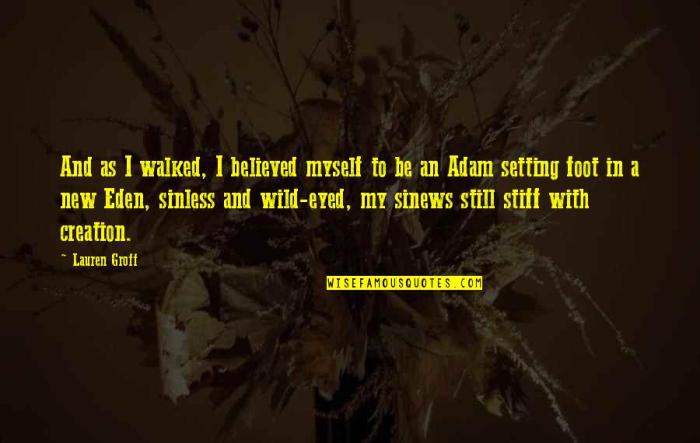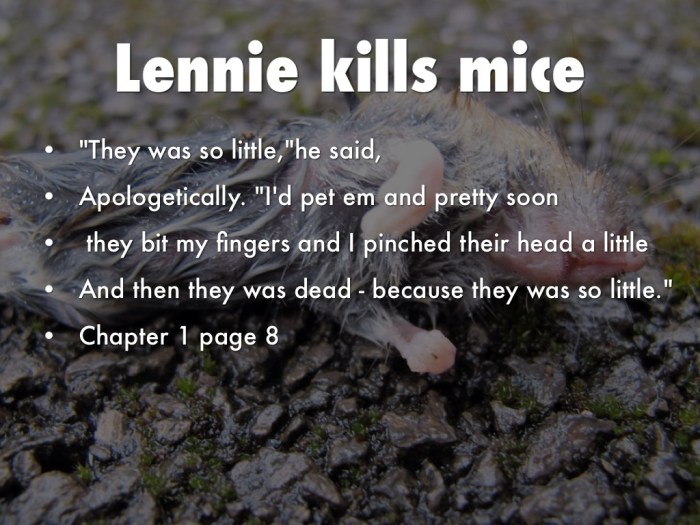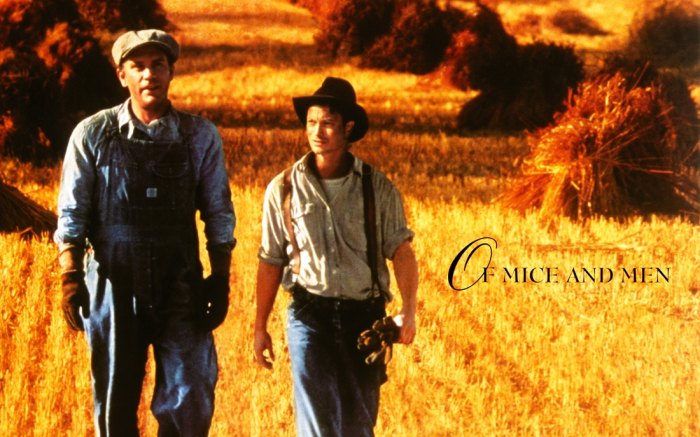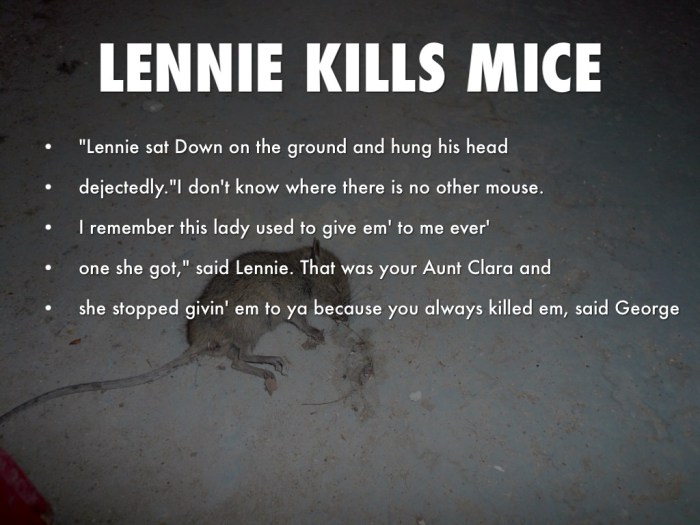“quote when george kills lennie”: a pivotal moment in John Steinbeck’s classic novel, Of Mice and Men, that has left an indelible mark on literature and readers alike. This profound scene, fraught with emotion and moral complexity, explores the unbreakable bond between two migrant workers and the tragic circumstances that ultimately tear them apart.
As the narrative unfolds, we witness George’s agonizing decision to end Lennie’s life, an act that sends shockwaves through the reader’s heart. Steinbeck’s masterful storytelling delves into the depths of friendship, loyalty, and the harsh realities of life in the American West.
Setting and Context

The scene unfolds in the brush along the Salinas River, where George and Lennie have been hiding out after fleeing from their ranch job. The setting is desolate and isolated, with only the sound of the river and the rustling of leaves breaking the silence.
Lennie has just killed Curley’s wife in a moment of panic and confusion. George, realizing that Lennie’s condition has worsened and that he will eventually be caught and killed, makes the difficult decision to end his friend’s life.
George’s Decision
George’s decision is motivated by several factors. First, he knows that Lennie is not capable of taking care of himself and that he will eventually be a danger to others. Second, he is aware that Lennie will be hunted down and killed by Curley and his men if he is not found first.
Finally, George believes that it is a merciful act to end Lennie’s life before he suffers a more painful and humiliating death.
Character Analysis: Quote When George Kills Lennie

George’s decision to kill Lennie is a complex and tragic one. On the one hand, he loves Lennie and knows that he is not responsible for his own actions. On the other hand, he knows that Lennie is a danger to himself and others, and that he will eventually be killed by the authorities if George does not do it himself.
George’s Motivations
- To protect Lennie from a painful death at the hands of the authorities
- To prevent Lennie from hurting others
- To end Lennie’s suffering
George’s Emotional Turmoil
George is torn between his love for Lennie and his knowledge that he must kill him. He is deeply saddened by the thought of killing his friend, but he knows that it is the right thing to do. George’s emotional turmoil is evident in the way he speaks to Lennie before he kills him.
After George’s fateful decision to end Lennie’s life, one can’t help but reflect on the resilience of the human spirit, akin to the collective strength of the Thirteen Colonies. Just as the acronym “VIRGINIA DELMARVAC” captures the diverse identities of those early American settlements, so too does the tragic story of Lennie and George highlight the complexities and challenges that shape our own lives.
“I’m sorry, Lennie. I gotta do it.”
These words show that George is both sorry for what he is about to do and determined to do it anyway.
Lennie’s Innocence
Lennie is a childlike character who is not responsible for his own actions. He does not understand the consequences of his actions, and he is easily led by others. Lennie’s innocence makes it even more difficult for George to kill him.
George knows that Lennie is not responsible for his actions, but he also knows that he is a danger to himself and others. He makes the difficult decision to kill Lennie in order to protect him from a painful death at the hands of the authorities.
Themes and Symbolism

This pivotal scene in “Of Mice and Men” explores profound themes and employs rich symbolism to convey the novel’s central ideas.
The overarching theme of friendshipis poignantly portrayed through the bond between George and Lennie. Despite their contrasting personalities and intellectual differences, their unwavering loyalty and shared dreams highlight the power of human connection.
Nature of Good and Evil
The scene also delves into the complex nature of good and evil. George’s decision to kill Lennie, motivated by compassion and the desire to end his friend’s suffering, raises questions about the boundaries between right and wrong.
Symbolism of Setting
The isolated clearing where the killing takes place symbolizes the characters’ emotional isolation and the harsh realities of their existence. The nearby Salinas River represents the inevitability of death and the futility of dreams.
Symbolism of Characters
Lennie’s childlike innocence and vulnerability symbolize the fragility of life and the need for protection. George, on the other hand, embodies the weight of responsibility and the harsh choices one must sometimes make.
Symbolism of Actions
The act of killing Lennie is both a physical and a symbolic act. It represents George’s acceptance of the harsh realities of life and his ultimate sacrifice for his friend’s well-being.
Together, these elements contribute to the scene’s profound meaning, exploring the complexities of human nature, the nature of good and evil, and the fragility of dreams.
Comparison to Other Works

Steinbeck’s depiction of Lennie’s death shares similarities with other tragic literary works, notably Shakespeare’s Romeo and Julietand Sophocles’ Oedipus Rex. These works explore the destructive power of fate and the tragic consequences of impulsive actions.
Like Romeo and Juliet, Lennie and George are victims of their circumstances. Their friendship is doomed from the start, as Lennie’s mental disability and society’s prejudice make their dreams of a better life impossible. George’s act of mercy, similar to Friar Laurence’s plan to reunite the star-crossed lovers, ultimately leads to tragedy.
Influence of Other Works
Steinbeck was likely influenced by the works of Shakespeare and Sophocles when writing this scene. The themes of fate, tragedy, and the power of friendship are central to both Romeo and Julietand Oedipus Rex. Steinbeck’s depiction of Lennie’s death as a necessary act of mercy, despite the immense pain it causes George, reflects the influence of these classic tragedies.
Critical Reception and Interpretation

The scene where George kills Lennie has garnered widespread critical acclaim and has been the subject of numerous interpretations. Critics have lauded Steinbeck’s masterful storytelling and the scene’s profound emotional impact.
Different Interpretations
One interpretation views the scene as a tragic necessity, with George having no other choice but to end Lennie’s life to prevent him from suffering a cruel and painful death at the hands of the vengeful mob.
Another interpretation sees the scene as a testament to the power of friendship and the sacrifices one is willing to make for those they love. George’s decision to kill Lennie is ultimately an act of mercy, sparing him from a life of misery and loneliness.
Impact on Readers, Quote when george kills lennie
The scene has had a profound impact on readers, leaving many with a sense of loss and sorrow. Steinbeck’s vivid prose and empathetic characterization evoke a deep emotional response, making the scene one of the most memorable and moving in all of literature.
Enduring Legacy
The scene continues to be studied and analyzed by literary scholars, with its significance and meaning still being debated today. It is a testament to Steinbeck’s literary genius and the enduring power of “Of Mice and Men.”
FAQ Explained
What is the significance of the setting in the scene where George kills Lennie?
The desolate landscape of the Salinas Valley mirrors the characters’ inner turmoil and foreshadows the tragic outcome.
How does George’s character evolve throughout the novel, leading to his decision to kill Lennie?
George’s initial protectiveness towards Lennie gradually transforms into a sense of responsibility and the realization that their dream of a better life is unattainable.
What are the ethical implications of George’s actions?
Steinbeck explores the moral dilemma of euthanasia and the limits of compassion in the face of adversity.